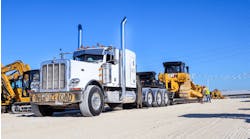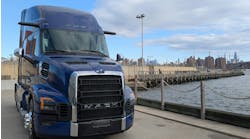Fleets just can't seem to buy enough heavy-duty trucks this year—quite literally, with most manufacturers reporting supplier shortages at some point in recent months as they work to build all the trucks on order. It's time for a look at the bread and butter of U.S. trucking: Classes 7 and 8, where there are more choices (and a broader range within them) than ever.
We broke out those classes this time around with our New Models review for two reasons. They're the classes at which drivers require a commercial driver's license to operate the vehicle, and many models in these classes can be spec'd as Class 7 or 8 trucks, depending on weight requirements.
Launch photo/ info slideshow: Heavy-duty models
There's no particular "buy off" taking place due to some all-new technology taking hold around the corner. Trucking fleets are doing well, and many are growing this year. There's plenty of need to move goods and capacity has been tight, making for higher freight rates, and electronic logging devices have thinned the heavy-duty truck herd a bit and amplified the effect.
In what's typically the weakest month of the year for Class 8 orders, fleets instead ordered an all-time high of 52,000 trucks in July. So it's the perfect time to consider the options, and no easy choice at that given the highly competent trucks available.
Big truck makers have arrived at the moment with new and recently-freshened offerings—fortunately so, since new truck development takes years. But very notably this year, we've included manufacturers never seen before.
It's clearly a sign of the times that electric truck OEMs like Thor Trucks and Tesla have entered the fray (another, Nikola, claims to have billions of dollars' worth of its trucks on preorder, but hasn't entered production yet). And nearly all of the traditionally diesel truck manufacturers are testing out and working on battery electric, hydrogen fuel cell, and other electric heavy truck options. Is it time for electric power in Class 8?



